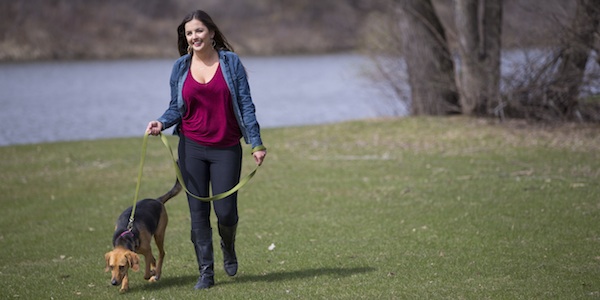
Makua Makai Building Connections Inland and Seaward
Aloha ‘Ãina (pronounced eye-nah) or “love for land” is a way of life on the Hawaiian island of Molokai. The people have a profound respect for nature and an understanding that from mauka (inland towards the mountains) to makai (seaward) everything is connected.
“Mauka Makai means what you do in one place affects the other,” says Moriah Ka’iulani Jenkins. Jenkins is a senior in animal ecology with a minor in animal science, pre-vet emphasis and a recipient of a George Washington Carver scholarship.
Jenkins was born and raised on the island of 7,500 people who value family, age-old traditions and their culture. Much of Jenkins’ schooling revolved around the importance and fragility of natural resources in an island ecosystem. Field trips to fish ponds, forest preserves and wetlands began as early as kindergarten. In contrast to the abundance of wildlife and a wide range of natural habitats, Molokai was, and still is, short on modern conveniences. There are no stoplights, malls, movie theaters, fast food restaurants or full-time veterinarians.
“I lost a lot of animals to trivial illnesses that could have been prevented,” says Jenkins. “With no vet to administer vaccinations, I lost a dog to Parvo. Another dog was hit by a car, but there were no emergency services, no vet. So I lost him.”
Jenkins knew she wanted to be a veterinarian and began volunteering for the local animal shelter at the age of eight. The Molokai Humane Society was housed in a 40-foot converted shipping container and had no running water or x-ray machine. The next year she began volunteering to help with bird counts for a wildlife biologist and learned the connection between shelter work and wildlife protection. Nonindigenous animals, such as cats, threaten native species, such as birds. Shelters that provide spay and neuter clinics can help keep feral and domestic animal populations in check.
After a tour of her top seven colleges in the summer of 2012, Jenkins chose Iowa State for its pre-veterinary medicine and animal ecology program- ming, and because “it was a big school with a small school feel.”
She is a self-described extrovert with a bubbly personality, who makes friends easily and loves to talk. While Jenkins prides herself on her strong communication skillset she explains, “I often found myself having to translate certain words from the Hawaiian language to English so that my friends and hall residents could better understand the nuances of my dialect.”
Back home Jenkins spoke Hawaii Creole English, usually referred to as Pidgin by Hawaiians. It is the first language of the majority of Hawaii’s locally-born children and the first language of a little less than half the state of Hawaii’s population.
During her first year at Iowa State, Jenkins relied on the Multicultural Student Association Office, her residence hall community adviser (CA) and newly-made friends to smooth the transition from Hawaii to Iowa. In 2013, her sophomore year, Jenkins became a CA for Larch Hall.
“I thought it was cool how CAs had the opportunity to create an inclusive community and create a home away from home. My CA had floor activities that helped me meet people and build close friendships. I thought it would be cool to be that person for others,” says Jenkins. “This is my third year. It’s been a long road with ups and downs, but I’ve learned a lot from it.”
Elizabeth Martinez-Podolsky is a multicultural liaison officer for the College of Agriculture and Life Sciences and was the hall director for Larch Residence Hall when Jenkins first became a CA.
“Moriah went through a lot her first year: academic challenges and also some challenges with some of the things that were going on at the residence hall with her residents. Through all of that she was really strong, used resources available to her, overcame those challenges and became a true leader,” says Podolsky.
Podolsky commended Jenkins for using Hawaiian words, traditions and philosophies to connect with others and support residents of Larch Hall and, at the same time, learn from other people’s experiences.
“I’m sure she knows every Hawaiian on campus. But she came to the Midwest for a reason. She wanted to experience something really different. She’s done a really good job of blending in with students and welcoming new experiences, from snow to Midwest living and Midwest food,” Podolsky says.
“At Iowa State, I think we’re such a unique mash-up of different cultures,” Jenkins says. “I’ve made friends from a lot of different countries. It’s been fun to learn about their cultures. Even people from different states have unique things to share, like I have being from Hawaii.”
Jenkins’ Iowa State adventure has included a study abroad semester in Ecuador and the Galápagos Islands where she assisted with spay and neuter operations on feral dogs. She has assisted veterinary medicine professor Wilson Rumbeiha with toxicology research since May 2014 and spent a summer on Maui as an endangered wildlife management intern.
After graduation, Jenkins will attend Western University of Health Sciences, College of Veterinary Medicine, in Pomona, California.
“I’ve volunteered at the Molokai Humane Society my whole life. They’re excited that I am the first person to get into vet school from my island,” says Jenkins.
After graduating from vet school, Jenkins plans to spend two years shadowing a vet who specializes in shelter medicine and then return to Molokai to offer the veterinary services that the island has been without for so long.



